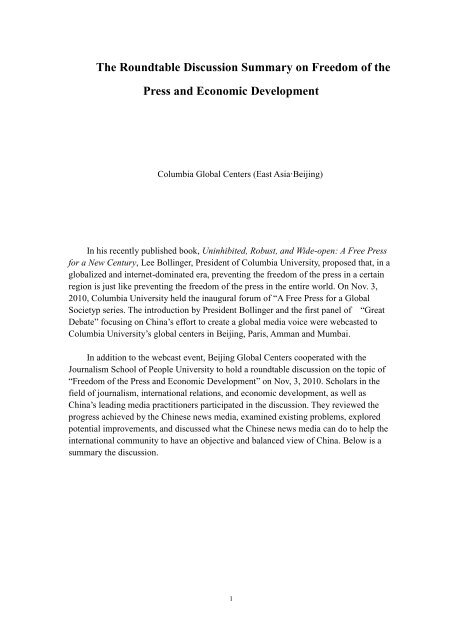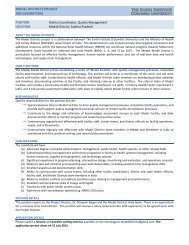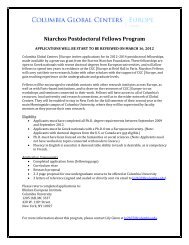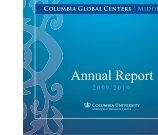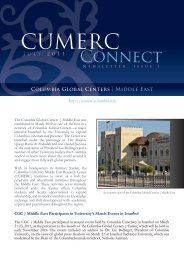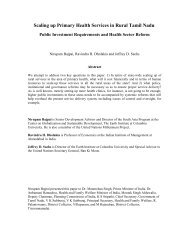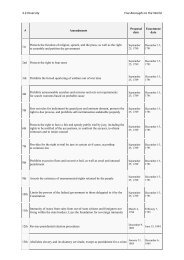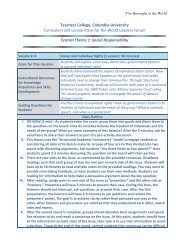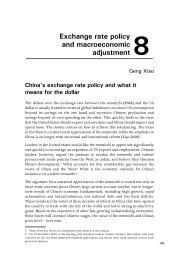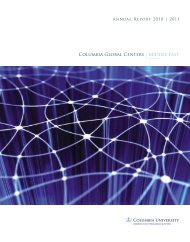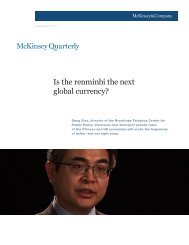The Roundtable Discussion Summary on Freedom of the Press and ...
The Roundtable Discussion Summary on Freedom of the Press and ...
The Roundtable Discussion Summary on Freedom of the Press and ...
Create successful ePaper yourself
Turn your PDF publications into a flip-book with our unique Google optimized e-Paper software.
<str<strong>on</strong>g>The</str<strong>on</strong>g> <str<strong>on</strong>g>Roundtable</str<strong>on</strong>g> <str<strong>on</strong>g>Discussi<strong>on</strong></str<strong>on</strong>g> <str<strong>on</strong>g>Summary</str<strong>on</strong>g> <strong>on</strong> <strong>Freedom</strong> <strong>of</strong> <strong>the</strong><br />
<strong>Press</strong> <strong>and</strong> Ec<strong>on</strong>omic Development<br />
Columbia Global Centers (East Asia·Beijing)<br />
In his recently published book, Uninhibited, Robust, <strong>and</strong> Wide-open: A Free <strong>Press</strong><br />
for a New Century, Lee Bollinger, President <strong>of</strong> Columbia University, proposed that, in a<br />
globalized <strong>and</strong> internet-dominated era, preventing <strong>the</strong> freedom <strong>of</strong> <strong>the</strong> press in a certain<br />
regi<strong>on</strong> is just like preventing <strong>the</strong> freedom <strong>of</strong> <strong>the</strong> press in <strong>the</strong> entire world. On Nov. 3,<br />
2010, Columbia University held <strong>the</strong> inaugural forum <strong>of</strong> “A Free <strong>Press</strong> for a Global<br />
Societyp series. <str<strong>on</strong>g>The</str<strong>on</strong>g> introducti<strong>on</strong> by President Bollinger <strong>and</strong> <strong>the</strong> first panel <strong>of</strong> “Great<br />
Debate” focusing <strong>on</strong> China’s effort to create a global media voice were webcasted to<br />
Columbia University’s global centers in Beijing, Paris, Amman <strong>and</strong> Mumbai.<br />
In additi<strong>on</strong> to <strong>the</strong> webcast event, Beijing Global Centers cooperated with <strong>the</strong><br />
Journalism School <strong>of</strong> People University to hold a roundtable discussi<strong>on</strong> <strong>on</strong> <strong>the</strong> topic <strong>of</strong><br />
“<strong>Freedom</strong> <strong>of</strong> <strong>the</strong> <strong>Press</strong> <strong>and</strong> Ec<strong>on</strong>omic Development” <strong>on</strong> Nov, 3, 2010. Scholars in <strong>the</strong><br />
field <strong>of</strong> journalism, internati<strong>on</strong>al relati<strong>on</strong>s, <strong>and</strong> ec<strong>on</strong>omic development, as well as<br />
China’s leading media practiti<strong>on</strong>ers participated in <strong>the</strong> discussi<strong>on</strong>. <str<strong>on</strong>g>The</str<strong>on</strong>g>y reviewed <strong>the</strong><br />
progress achieved by <strong>the</strong> Chinese news media, examined existing problems, explored<br />
potential improvements, <strong>and</strong> discussed what <strong>the</strong> Chinese news media can do to help <strong>the</strong><br />
internati<strong>on</strong>al community to have an objective <strong>and</strong> balanced view <strong>of</strong> China. Below is a<br />
summary <strong>the</strong> discussi<strong>on</strong>.<br />
1
<str<strong>on</strong>g>The</str<strong>on</strong>g> Competitive <strong>and</strong> Fast-changing Chinese News Media<br />
China has been developing rapidly <strong>and</strong> is already <strong>the</strong> world’s sec<strong>on</strong>d largest<br />
ec<strong>on</strong>omy. Typically, Western countries are impressed with <strong>the</strong>se ec<strong>on</strong>omic<br />
achievements, but fail to notice <strong>the</strong> great changes that have transformed <strong>the</strong> Chinese<br />
news media. <str<strong>on</strong>g>The</str<strong>on</strong>g>y remain stuck in <strong>the</strong> mindset that it still serves as a propag<strong>and</strong>a tool.<br />
Participating scholars agreed that communicati<strong>on</strong> resources in China is c<strong>on</strong>sidered<br />
a powerful resource for ideology <strong>and</strong> nati<strong>on</strong>al security, <strong>and</strong> thus should be subject to<br />
strict c<strong>on</strong>trol. Despite this, <strong>the</strong> Chinese news media is not all <strong>on</strong>e-sided <strong>and</strong> homogenous;<br />
<strong>on</strong> <strong>the</strong> c<strong>on</strong>trary, in order to attract audience <strong>and</strong> increase influence, <strong>the</strong> Chinese media is<br />
adept at using various resources, innovating operati<strong>on</strong> models, building br<strong>and</strong>, <strong>and</strong><br />
maximizing pr<strong>of</strong>its. As a matter <strong>of</strong> fact, <strong>the</strong> Chinese media has already become a major<br />
industry <strong>and</strong> a new source <strong>of</strong> ec<strong>on</strong>omic growth. In <strong>the</strong> past, <strong>the</strong> Chinese ec<strong>on</strong>omy mainly<br />
relied <strong>on</strong> <strong>the</strong> manufacturing <strong>and</strong> heavy industry to develop, but in <strong>the</strong> future, <strong>the</strong> media<br />
industry will experience some <strong>of</strong> <strong>the</strong> most robust growth.<br />
Under government c<strong>on</strong>trol, <strong>the</strong> Chinese media has trended towards<br />
“de-politicizati<strong>on</strong>”. Firstly, <strong>on</strong> <strong>the</strong> local level, city newspapers <strong>and</strong> evening newspapers<br />
are taking an increasingly large market share. <str<strong>on</strong>g>The</str<strong>on</strong>g>y focus mostly <strong>on</strong> trivial topics <strong>of</strong><br />
families’ daily life, catering to <strong>the</strong> taste <strong>of</strong> <strong>the</strong> lower-middle class. Sec<strong>on</strong>dly, <strong>the</strong> financial<br />
media, less involved in ideology <strong>and</strong> <strong>the</strong>refore less subject to c<strong>on</strong>trol, has developed<br />
rapidly. With 200 milli<strong>on</strong> stock investors <strong>and</strong> 200 milli<strong>on</strong> internet users, China has<br />
experienced dramatic ec<strong>on</strong>omic <strong>and</strong> social changes. Since people’s asset structure<br />
changed significantly, asset management has become a major issue that c<strong>on</strong>cerns many<br />
Chinese people. A sharp increase <strong>of</strong> dem<strong>and</strong> for financial informati<strong>on</strong> has driven fast<br />
growth <strong>of</strong> <strong>the</strong> financial media. Thanks to relatively relaxed restricti<strong>on</strong>s from <strong>the</strong><br />
government, <strong>the</strong> financial media witnesses str<strong>on</strong>g innovati<strong>on</strong>, fierce market competiti<strong>on</strong>,<br />
as well as clear market stratificati<strong>on</strong>. C<strong>on</strong>sequently, <strong>the</strong> financial media has become<br />
increasingly sophisticated <strong>and</strong> pr<strong>of</strong>essi<strong>on</strong>al.<br />
Driven by a str<strong>on</strong>g pr<strong>of</strong>it motive, even <strong>the</strong> most orthodox government-run Chinese<br />
media organizati<strong>on</strong> has c<strong>on</strong>stantly innovated itself in order to attract its audience, exp<strong>and</strong><br />
market share <strong>and</strong> increase influence. For example, <strong>the</strong> Xinhua News Agency has<br />
underg<strong>on</strong>e tremendous change in <strong>the</strong> past 30 years. It founded <strong>the</strong> Xinhua net <strong>and</strong>, more<br />
recently, added a TV stati<strong>on</strong>. Ano<strong>the</strong>r <strong>of</strong>ficial newspaper, Reference News, has tried hard<br />
to stabilize its sales volume. Global Times, affiliated to <strong>the</strong> People’s Daily, has notably<br />
exp<strong>and</strong>ed its market share. <str<strong>on</strong>g>The</str<strong>on</strong>g> China Central Televisi<strong>on</strong> (CCTV) also has been<br />
innovating c<strong>on</strong>stantly in order to improve viewers’ ratings. Even its <strong>of</strong>ficial “Nati<strong>on</strong>al<br />
News Broadcast Program” pays attenti<strong>on</strong> to ratings. Despite <strong>the</strong> fact that<br />
government-run Chinese media organizati<strong>on</strong>s, with <strong>the</strong> local communist party<br />
established in each <strong>of</strong> <strong>the</strong>m, are still under strict c<strong>on</strong>trol, <strong>the</strong>y compete fiercely against<br />
2
<strong>on</strong>e ano<strong>the</strong>r.<br />
<str<strong>on</strong>g>The</str<strong>on</strong>g> Chinese media audience also appears to be differentiated. For example, <strong>the</strong><br />
Global Times inspires nati<strong>on</strong>alist sentiment while <strong>the</strong> Sou<strong>the</strong>rn Weekend holds a more<br />
liberal view. <str<strong>on</strong>g>The</str<strong>on</strong>g>y both have distinct, sizable reader bases. <str<strong>on</strong>g>The</str<strong>on</strong>g> diversity <strong>of</strong> <strong>the</strong> audience<br />
market has provided incentive to push <strong>the</strong> Chinese media toward market ec<strong>on</strong>omy.<br />
After comparing <strong>the</strong> envir<strong>on</strong>ment <strong>of</strong> mainl<strong>and</strong> China with those <strong>of</strong> Taiwan <strong>and</strong><br />
western countries, some media pr<strong>of</strong>essi<strong>on</strong>als felt that <strong>the</strong> development opportunity for<br />
<strong>the</strong> media <strong>of</strong> mainl<strong>and</strong> China was more favorable at present. While many Western<br />
newspapers are out <strong>of</strong> business after <strong>the</strong> financial crisis, in mainl<strong>and</strong> China, hundreds <strong>of</strong><br />
milli<strong>on</strong>s <strong>of</strong> readers still regularly read newspapers <strong>and</strong> journals. If <strong>the</strong> Chinese print<br />
press can c<strong>on</strong>tinue to try hard to provide what readers like to read, pr<strong>of</strong>it potential will<br />
be huge, given <strong>the</strong> <strong>on</strong>-going trend <strong>of</strong> “de-politicizati<strong>on</strong>” <strong>and</strong> diversificati<strong>on</strong>. In <strong>the</strong> U.S.,<br />
as more readers give up reading newspapers <strong>and</strong> journals, <strong>the</strong> majority <strong>of</strong> <strong>the</strong> U.S. media<br />
companies have yet to develop pr<strong>of</strong>itable business practices in <strong>the</strong> internet <strong>and</strong> blog<br />
envir<strong>on</strong>ment. <str<strong>on</strong>g>The</str<strong>on</strong>g>refore, <strong>the</strong> Chinese media is now in its golden time.<br />
3
Areas <strong>of</strong> Potential Improvements<br />
Some scholars pointed out media organizati<strong>on</strong>s should not be pr<strong>of</strong>it-driven <strong>on</strong>ly,<br />
<strong>the</strong>y should shoulder <strong>the</strong> important resp<strong>on</strong>sibility <strong>of</strong> influencing society. In additi<strong>on</strong> to<br />
making a pr<strong>of</strong>it by providing what <strong>the</strong> audience needs, <strong>the</strong>y should also help establish a<br />
society ruled by law through disseminating <strong>and</strong> analyzing informati<strong>on</strong>.<br />
Some scholars believed that <strong>the</strong> deepening <strong>of</strong> globalizati<strong>on</strong> makes it<br />
comparatively easy to invoke a nati<strong>on</strong>alist sentiment at any time. If <strong>the</strong> Chinese news<br />
media wants to create a friendly internati<strong>on</strong>al envir<strong>on</strong>ment for China’s development, it<br />
needs to step up its communicati<strong>on</strong> effort, improve informati<strong>on</strong> sharing, facilitate<br />
dialogue between different countries, <strong>and</strong> increase cross-culture <strong>and</strong> cross-nati<strong>on</strong><br />
underst<strong>and</strong>ing <strong>and</strong> trust. To this end, <strong>the</strong>re is ample room for <strong>the</strong> Chinese media to<br />
improve.<br />
When reporting internati<strong>on</strong>al news to domestic audience, <strong>the</strong> Chinese media tends<br />
to stay at a superficial level <strong>and</strong> <strong>of</strong>ten fails to provide any in-depth analysis <strong>and</strong> insight.<br />
It <strong>of</strong>ten selects <strong>and</strong> emphasizes <strong>the</strong> Chinese elements in those events. Take <strong>the</strong> U.S.<br />
midterm electi<strong>on</strong> as an example. Both China’s <strong>of</strong>ficial <strong>and</strong> market-oriented media<br />
c<strong>on</strong>sistently focused <strong>the</strong>ir coverage <strong>on</strong> <strong>the</strong> issue <strong>of</strong> <strong>the</strong> RMB exchange rate <strong>and</strong><br />
American politicians’ criticism <strong>of</strong> China in <strong>the</strong>ir electi<strong>on</strong> campaigns. In reality, <strong>the</strong><br />
focus <strong>of</strong> <strong>the</strong> topic for <strong>the</strong> U.S. midterm electi<strong>on</strong> was <strong>the</strong> U.S. ec<strong>on</strong>omy, not China.<br />
Biased coverage affects <strong>the</strong> public percepti<strong>on</strong> <strong>of</strong> events, <strong>the</strong>reby affecting <strong>the</strong><br />
government’s decisi<strong>on</strong>-making.<br />
Fur<strong>the</strong>rmore, <strong>the</strong> Chinese media lacks l<strong>on</strong>g-term, follow-up coverage <strong>of</strong><br />
internati<strong>on</strong>al events. <str<strong>on</strong>g>The</str<strong>on</strong>g>y <strong>of</strong>ten swarm to ad hoc reporting after some high-pr<strong>of</strong>ile<br />
incident occurs. For example, it had been quite a while since <strong>the</strong> US strategic center<br />
shifted back towards Asia. However, <strong>the</strong> China media portrayed <strong>the</strong> return <strong>of</strong> <strong>the</strong> US to<br />
Asia as something that suddenly happened in <strong>the</strong> past <strong>on</strong>e or two m<strong>on</strong>ths. Similarly, a lot<br />
<strong>of</strong> internati<strong>on</strong>al relati<strong>on</strong>s issues, such as <strong>the</strong> South China Sea <strong>and</strong> <strong>the</strong> Yellow Sea issue,<br />
<strong>the</strong> bilateral relati<strong>on</strong>s with neighboring countries in <strong>the</strong> South-east Asia, <strong>and</strong> <strong>the</strong> role <strong>of</strong><br />
<strong>the</strong> U.S. in such relati<strong>on</strong>s, did not emerge overnight. Instead, <strong>the</strong>y evolved <strong>and</strong><br />
developed over a l<strong>on</strong>g period <strong>of</strong> time. <str<strong>on</strong>g>The</str<strong>on</strong>g> lack <strong>of</strong> l<strong>on</strong>g-term, follow-up coverage for<br />
<strong>the</strong>se issues by <strong>the</strong> Chinese media misled <strong>the</strong> Chinese people to believe that all <strong>the</strong>se<br />
happened suddenly.<br />
China needs to have a healthy, collaborative <strong>and</strong> mutually beneficial relati<strong>on</strong>ship<br />
with <strong>the</strong> rest <strong>of</strong> <strong>the</strong> world, which requires that editors <strong>and</strong> journalists resp<strong>on</strong>sible for<br />
internati<strong>on</strong>al reporting should not limit <strong>the</strong>mselves to <strong>the</strong> utilitarian mentality <strong>of</strong><br />
selecting <strong>on</strong>ly “eye-catching” news, but have a rati<strong>on</strong>al approach. This will ensure that<br />
news coverage is truly beneficial to <strong>the</strong> cooperati<strong>on</strong> between China <strong>and</strong> <strong>the</strong> world, <strong>and</strong><br />
4
China’s ec<strong>on</strong>omic development as well. As media’s coverage is quite influential to<br />
public opini<strong>on</strong>, which, in turn, will affect <strong>the</strong> government’s choice <strong>of</strong> policies, it is<br />
especially important for <strong>the</strong> media to present balanced perspectives. To some extent,<br />
public opini<strong>on</strong>s <strong>on</strong> internati<strong>on</strong>al relati<strong>on</strong>s <strong>and</strong> foreign ec<strong>on</strong>omic affairs have already<br />
affected policy-making.<br />
Some scholars observed that, in todays’ world, domestic politics <strong>and</strong> ec<strong>on</strong>omy have<br />
become more <strong>and</strong> more internati<strong>on</strong>alized, while internati<strong>on</strong>al politics <strong>and</strong> ec<strong>on</strong>omy have<br />
become more <strong>and</strong> more domestic. As globalizati<strong>on</strong> trend has developed in depth <strong>and</strong><br />
breadth, nati<strong>on</strong>alist sentiments have flared in many places. Because <strong>the</strong> media plays a<br />
special role in guiding public opini<strong>on</strong> <strong>and</strong> disseminating ideas, it is likely that <strong>the</strong> media<br />
will be used by certain interest groups or a school <strong>of</strong> thought to influence public opini<strong>on</strong>.<br />
Some scholars emphasized that <strong>the</strong> public should be aware that nati<strong>on</strong>alism is not equal<br />
to patriotism; <strong>on</strong>ly rati<strong>on</strong>al, tolerant <strong>and</strong> open nati<strong>on</strong>alism can have something in<br />
comm<strong>on</strong> with patriotism. Narrow-minded, xenophobic <strong>and</strong> extreme nati<strong>on</strong>alism is<br />
irrelevant to patriotism.<br />
Under such circumstances, reports from <strong>the</strong> Chinese media should be based <strong>on</strong><br />
objective facts. Although every media organizati<strong>on</strong> promotes itself as objective <strong>and</strong><br />
truthful, under <strong>the</strong> current secularizati<strong>on</strong> <strong>and</strong> diversificati<strong>on</strong> trend, <strong>the</strong> media has to<br />
represent a certain interest group, or channel <strong>the</strong> aspirati<strong>on</strong>s <strong>and</strong> thoughts <strong>of</strong> certain<br />
groups <strong>of</strong> people. How has this fact affected <strong>the</strong> Chinese media recently?<br />
For an instance, when <strong>the</strong> Chinese media reported <strong>on</strong> <strong>the</strong> speech by <strong>the</strong> U.S.<br />
Secretary <strong>of</strong> <strong>the</strong> State Hillary Clint<strong>on</strong> in Cambodia, <strong>the</strong>y used ei<strong>the</strong>r “Hillary provoked<br />
Cambodia-China relati<strong>on</strong>s” or “Hillary incited Cambodia not to be over-reliant <strong>on</strong><br />
China”, very emoti<strong>on</strong>al headlines. As a matter <strong>of</strong> fact, <strong>the</strong>re is a large paragraph in<br />
Clint<strong>on</strong>’s speech saying “China is a great country, China will have a very bright<br />
future….We fully underst<strong>and</strong> <strong>the</strong> special relati<strong>on</strong>ship between Cambodia <strong>and</strong> China, <strong>and</strong><br />
we hope this kind <strong>of</strong> relati<strong>on</strong>ship can be developed.” Of course she did make <strong>the</strong><br />
following remarks: “I hope you can surely raise questi<strong>on</strong>s with China <strong>and</strong> not be<br />
over-reliant <strong>on</strong> a single country”. In order to be eye-catching, some <strong>of</strong> <strong>the</strong> Chinese media<br />
left out <strong>the</strong> main intent <strong>of</strong> Clint<strong>on</strong>’s speech <strong>and</strong> <strong>on</strong>ly used her last sentence to make a<br />
provocative headline.<br />
This reflects that although China has already become <strong>the</strong> world’s sec<strong>on</strong>d largest<br />
ec<strong>on</strong>omy, many Chinese people do not have <strong>the</strong> mindset <strong>and</strong> heart that citizens <strong>of</strong> large<br />
countries should have; ra<strong>the</strong>r, <strong>the</strong>y still feel victimized <strong>and</strong> are very sensitive. If media<br />
practiti<strong>on</strong>ers also share this sort <strong>of</strong> narrow mindset <strong>and</strong> sentiment, <strong>the</strong>y will surely<br />
inappropriately mislead <strong>the</strong>ir audience.<br />
As China is rising as a major world power <strong>and</strong> challenging <strong>the</strong> status quo <strong>of</strong> <strong>the</strong><br />
world order, it certainly will face accusati<strong>on</strong>s from entrenched interest groups. At a time<br />
5
like this, it is imperative that <strong>the</strong> media have a high sense <strong>of</strong> social resp<strong>on</strong>sibility <strong>and</strong><br />
historical accuracy when it comes to selecting news for <strong>the</strong> audience. A mature <strong>and</strong><br />
well-developed China media should be an integrated part <strong>of</strong> China’s healthy ec<strong>on</strong>omic<br />
<strong>and</strong> social development, <strong>and</strong> globalizati<strong>on</strong> as well. In this regard, <strong>the</strong> Chinese media still<br />
has substantial room for improvement.<br />
For <strong>the</strong> benefit <strong>of</strong> China’s development, it is very important to report Chinese<br />
events to <strong>the</strong> internati<strong>on</strong>al audience, establishing a good Chinese image <strong>and</strong> generating<br />
favorable public opini<strong>on</strong> in <strong>the</strong> world. In this regard, <strong>the</strong> Chinese media is not doing<br />
enough. <str<strong>on</strong>g>The</str<strong>on</strong>g> reporters <strong>and</strong> journalists who provide China coverage to <strong>the</strong> internati<strong>on</strong>al<br />
audience are largely <strong>the</strong> same group <strong>of</strong> people, who also serve <strong>the</strong> domestic audience,<br />
with similar editing policies. As <strong>the</strong> domestic news media still struggles with a variety <strong>of</strong><br />
problems, how can <strong>the</strong> Chinese media’s engagement with <strong>the</strong> world do a better job? In<br />
fact, c<strong>on</strong>servatives with an old-mind set still c<strong>on</strong>trols both domestic news media <strong>and</strong><br />
China media’s reach out to <strong>the</strong> world. In additi<strong>on</strong>, quality news reporting, targeted to <strong>the</strong><br />
internati<strong>on</strong>al audience, largely depends <strong>on</strong> an individual journalist’s subjective judgment,<br />
pr<strong>of</strong>essi<strong>on</strong>al capability <strong>and</strong> integrity because <strong>of</strong> <strong>the</strong> lack <strong>of</strong> clear editing rules or<br />
guidelines that is suited to <strong>the</strong> internati<strong>on</strong>al audience.<br />
A media practiti<strong>on</strong>er proposed that in every story, especially in key stories, <strong>the</strong><br />
media should report, explain <strong>and</strong> elaborate clearly to a foreign audience what <strong>the</strong><br />
Chinese people were doing <strong>and</strong> thinking, how <strong>the</strong> Chinese formed <strong>the</strong>ir impressi<strong>on</strong>s <strong>of</strong><br />
foreign countries, <strong>and</strong> what kind <strong>of</strong> impact had been generated. In <strong>on</strong>e instance, she went<br />
to Washingt<strong>on</strong> D.C. to elucidate for <strong>the</strong> American experts from governmental<br />
departments <strong>and</strong> think tanks how <strong>the</strong> Chinese media had influenced Chinese people’s<br />
impressi<strong>on</strong> <strong>of</strong> <strong>the</strong> U.S. She elaborated with <strong>the</strong> coverage <strong>of</strong> <strong>the</strong> Yellow Sea issue as an<br />
example. By this effort, she <strong>and</strong> American experts were able to engage in mutual<br />
communicati<strong>on</strong>, although <strong>the</strong>y did not necessarily agree with each o<strong>the</strong>r. This was a big<br />
step forward since Westerners <strong>of</strong>ten perceived a dem<strong>on</strong>ized China in <strong>the</strong>ir media. This<br />
was <strong>on</strong>ly a small event, but it might have a big effect. <str<strong>on</strong>g>The</str<strong>on</strong>g>refore, <strong>the</strong> establishment <strong>of</strong> a<br />
good image <strong>of</strong> China in <strong>the</strong> world should be based <strong>on</strong> more stories like this through our<br />
c<strong>on</strong>tinuous <strong>and</strong> gradual effort. We should think hard to find an intelligent <strong>and</strong> h<strong>on</strong>est<br />
way to let <strong>the</strong> internati<strong>on</strong>al community to appreciate a real China.<br />
As China grows rapidly, <strong>the</strong> China threat <strong>the</strong>ory has gained prominence in <strong>the</strong><br />
internati<strong>on</strong>al community. Some scholars pointed out that our misuse <strong>of</strong> wording <strong>and</strong><br />
limited underst<strong>and</strong>ing <strong>of</strong> internati<strong>on</strong>al relati<strong>on</strong>s could partly be blamed for letting our<br />
adversaries gain ground <strong>on</strong> us. For example, Deng Xiaoping <strong>on</strong>ce characterized our<br />
diplomatic strategies with a Chinese idiom, which was translated as “keep a low pr<strong>of</strong>ile<br />
<strong>and</strong> c<strong>on</strong>ceal our true abilities to bide our time.” When it was spread out, it took <strong>on</strong> a<br />
meaning that was different from what Deng might have intended it to be. It made many<br />
people in <strong>the</strong> world thought that China wanted to accumulate strength in order to<br />
achieve a certain goal or take revenge.<br />
6
More <strong>Freedom</strong> <strong>of</strong> Speech <strong>and</strong> a Better Chinese News Media<br />
Some scholars at <strong>the</strong> discussi<strong>on</strong> agreed that China’s news media was less competent<br />
than <strong>the</strong> US media at having its message reach <strong>the</strong> internati<strong>on</strong>al community <strong>and</strong> gaining<br />
a say in <strong>the</strong> world. <str<strong>on</strong>g>The</str<strong>on</strong>g>y pointed out <strong>on</strong>e major reas<strong>on</strong> was that <strong>the</strong> Chinese news media<br />
was allowed to have <strong>on</strong>ly <strong>on</strong>e “single voice”. This restricti<strong>on</strong> actually works against <strong>the</strong><br />
credibility <strong>of</strong> China’s news media. In comparis<strong>on</strong>, <strong>the</strong>re are a variety <strong>of</strong> voices in <strong>the</strong> U.S.<br />
media, with <strong>the</strong> mainstream opini<strong>on</strong> <strong>of</strong>ten inevitably dominating all <strong>the</strong> o<strong>the</strong>rs. In China,<br />
high-ranking <strong>of</strong>ficials <strong>of</strong>ten set a t<strong>on</strong>e for <strong>the</strong> “single voice” that is allowed. Without any<br />
reas<strong>on</strong>ing <strong>and</strong> debates, <strong>the</strong> government-designated “single voice” in <strong>the</strong> media cannot<br />
even gain credibility from its own people, let al<strong>on</strong>e <strong>the</strong> internati<strong>on</strong>al community. It has<br />
limited influence <strong>on</strong> society as people simply shrug it <strong>of</strong>f as “<strong>of</strong>ficial propag<strong>and</strong>a”.<br />
<str<strong>on</strong>g>The</str<strong>on</strong>g>refore, if China wants to improve its communicati<strong>on</strong> capability or influence<br />
internati<strong>on</strong>al public opini<strong>on</strong>, it must give academia freedom <strong>of</strong> speech. A mainstream<br />
voice will find its way from a variety <strong>of</strong> voices; <strong>and</strong> core values will st<strong>and</strong> out in a<br />
pluralistic society where people’s aspirati<strong>on</strong>s <strong>and</strong> requests are fully channeled <strong>and</strong> heard.<br />
Some scholars compared how <strong>the</strong> US <strong>and</strong> China have acted differently <strong>on</strong> <strong>the</strong> RMB<br />
exchange rate issue. Many think tanks in <strong>the</strong> U.S. started studying <strong>the</strong> exchange rate<br />
issue as early as 2004. <str<strong>on</strong>g>The</str<strong>on</strong>g>y published columns in various media <strong>and</strong> engaged in<br />
hearings in c<strong>on</strong>gress. <str<strong>on</strong>g>The</str<strong>on</strong>g> experts who participated in <strong>the</strong> hearings were actually<br />
specially selected, <strong>and</strong> recordings <strong>of</strong> <strong>the</strong> hearings were widely disseminated. By<br />
allowing public access to such hearings, <strong>the</strong> US government had its message heard by<br />
<strong>the</strong> public. At <strong>the</strong> same time, <strong>the</strong> media presented many perspectives. Not <strong>on</strong>ly did<br />
different media groups discuss <strong>the</strong> issue from different angles, even <strong>the</strong> same media<br />
source would present different opini<strong>on</strong>s. <strong>Freedom</strong> <strong>of</strong> speech was readily apparent.<br />
Eventually, mainstream thinking emerged am<strong>on</strong>g a variety <strong>of</strong> voices. In c<strong>on</strong>trast, China<br />
did relatively poorly <strong>on</strong> <strong>the</strong> same issue. <str<strong>on</strong>g>The</str<strong>on</strong>g> perspectives <strong>of</strong> China’s experts <strong>on</strong> <strong>the</strong> RMB<br />
exchange rate issue were actually diverse. For example, research findings <strong>of</strong> <strong>the</strong> People’s<br />
University <strong>and</strong> that <strong>of</strong> <strong>the</strong> Chinese Academy <strong>of</strong> Social Sciences (CASS) differed quite a<br />
lot. But <strong>the</strong> Chinese government required <strong>the</strong> experts not to speak “incorrectly” about<br />
<strong>the</strong> foreign exchange rate issue, leaving <strong>on</strong>ly <strong>on</strong>e single approved voice to be heard by<br />
<strong>the</strong> public. While in <strong>the</strong> US, <strong>the</strong> C<strong>on</strong>gress, Department <strong>of</strong> Commerce, Department <strong>of</strong><br />
Treasury <strong>and</strong> Trade Representative Office <strong>of</strong>ten emphasized different perspectives <strong>of</strong> <strong>the</strong><br />
same issue at different points <strong>of</strong> time, some playing <strong>the</strong> good guy, some playing <strong>the</strong> bad<br />
guy. <str<strong>on</strong>g>The</str<strong>on</strong>g> single-voice strategy <strong>of</strong> <strong>the</strong> Chinese government, in fact, weakened <strong>the</strong><br />
effectiveness <strong>of</strong> <strong>the</strong> role that <strong>the</strong> media could have played in disseminating its message.<br />
Even its own people did not buy what could have been a c<strong>on</strong>vincing argument from <strong>the</strong><br />
government.<br />
Under <strong>the</strong> pressure from <strong>the</strong> US government <strong>on</strong> <strong>the</strong> exchange rate issue, <strong>the</strong><br />
Chinese experts have d<strong>on</strong>e a lot <strong>of</strong> research. It has become increasingly clear that <strong>the</strong><br />
7
exchange rate issue cannot solve <strong>the</strong> US’ problems. <str<strong>on</strong>g>The</str<strong>on</strong>g> key issue is that our scholars<br />
<strong>and</strong> experts should be given freedom to voice <strong>the</strong>ir views freely in <strong>the</strong> media. If China<br />
does not let <strong>the</strong> world know <strong>the</strong> real discussi<strong>on</strong> <strong>on</strong> this issue in China, it is difficult for<br />
<strong>the</strong> rest <strong>of</strong> <strong>the</strong> world, who knows nothing about <strong>the</strong> thinking behind China’s positi<strong>on</strong>, to<br />
underst<strong>and</strong> China. If China blames <strong>the</strong> rest <strong>of</strong> <strong>the</strong> world for <strong>the</strong> misunderst<strong>and</strong>ing, it will<br />
give excuses for foreign media to c<strong>on</strong>tinually dem<strong>on</strong>ize China, leading to a vicious<br />
circle.<br />
Some scholars observed that in China’s current media envir<strong>on</strong>ment, freedom <strong>of</strong> <strong>the</strong><br />
press has become a sensitive issue that can’t be touched. In fact, if <strong>the</strong> academic<br />
community is given freedom to speak up <strong>the</strong>ir views <strong>and</strong> different voices are allowed,<br />
open debates will help lead us to <strong>the</strong> truth. This would also give China legitimacy in its<br />
dialogue with foreign governments <strong>and</strong> media. China achieved remarkable ec<strong>on</strong>omic<br />
growth <strong>and</strong> made tremendous c<strong>on</strong>tributi<strong>on</strong> to <strong>the</strong> world ec<strong>on</strong>omy in <strong>the</strong> past thirty years,<br />
but it was criticized repeatedly <strong>on</strong> issues like <strong>the</strong> RMB exchange rate. One reas<strong>on</strong> for<br />
this is that <strong>the</strong> rules <strong>of</strong> game in <strong>the</strong> political <strong>and</strong> ec<strong>on</strong>omic world arena are dominated by<br />
<strong>the</strong> western countries. If China’s ec<strong>on</strong>omic <strong>and</strong> journalism scholars, think tanks, <strong>and</strong><br />
media want to change <strong>the</strong> rules <strong>of</strong> game <strong>and</strong> gain more say in <strong>the</strong> world, <strong>the</strong>y must be<br />
given freedom <strong>of</strong> speech so that <strong>the</strong>y can have open discussi<strong>on</strong>s <strong>and</strong> have <strong>the</strong>ir messages<br />
sent out.<br />
Some scholars thought that <strong>the</strong> Chinese media was not successful in reporting<br />
issues such as <strong>the</strong> exchange rate, <strong>the</strong> Sino-Japan relati<strong>on</strong>s, etc. <str<strong>on</strong>g>The</str<strong>on</strong>g> media failed to<br />
acquire a deep underst<strong>and</strong>ing <strong>of</strong> <strong>the</strong>se issues, nor did it provide rati<strong>on</strong>al guidance for<br />
public sentiments. Its superficial, single-voice dominated coverage made it lose<br />
credibility from its audience.<br />
Excessive restricti<strong>on</strong>s <strong>on</strong> how to voice <strong>the</strong>ir views in <strong>the</strong> media are imposed <strong>on</strong><br />
Chinese experts <strong>and</strong> scholars, making it impossible for <strong>the</strong> internati<strong>on</strong>al community,<br />
especially those in <strong>the</strong> US, Japan, <strong>and</strong> Europe, to underst<strong>and</strong> China in an accurate <strong>and</strong><br />
objective way. Many American C<strong>on</strong>gressmen have not even been to China. <str<strong>on</strong>g>The</str<strong>on</strong>g>ir<br />
impressi<strong>on</strong>s <strong>of</strong> China mainly come from <strong>the</strong> western media. <str<strong>on</strong>g>The</str<strong>on</strong>g> Chinese media fails to<br />
win over <strong>the</strong> internati<strong>on</strong>al audience because Chinese experts <strong>and</strong> scholars are restricted<br />
to share <strong>the</strong>ir views in <strong>the</strong> media.<br />
Participating scholars suggested that in <strong>the</strong> current internati<strong>on</strong>al envir<strong>on</strong>ment, how<br />
to give more freedom to <strong>the</strong> academic community <strong>and</strong> how to let <strong>the</strong> world to<br />
underst<strong>and</strong> China through more objective coverage <strong>of</strong> <strong>the</strong> Chinese media is a very<br />
important issue, which should be raised as a top priority with <strong>the</strong> highest level<br />
decisi<strong>on</strong>-makers. Even from a domestic perspective, a free press <strong>and</strong> <strong>the</strong> reform <strong>of</strong> <strong>the</strong><br />
Chinese media are also critically important. After 30 years <strong>of</strong> opening up, ec<strong>on</strong>omic<br />
reform cannot go any fur<strong>the</strong>r without taking <strong>on</strong> political reform. O<strong>the</strong>rwise, fur<strong>the</strong>r<br />
ec<strong>on</strong>omic development would be adversely affected. In additi<strong>on</strong>, with <strong>the</strong> development<br />
8
<strong>of</strong> civil society in China, citizens also hope to have more freedom <strong>of</strong> speech <strong>and</strong> more<br />
involvement in policy making. Under such circumstances, scholars at <strong>the</strong> discussi<strong>on</strong><br />
called for an effective communicati<strong>on</strong> mechanism with <strong>the</strong> help <strong>of</strong> <strong>the</strong> media so that <strong>the</strong>y<br />
can share <strong>the</strong>ir observati<strong>on</strong>s <strong>and</strong> research results with <strong>the</strong> public <strong>and</strong> governmental<br />
<strong>of</strong>ficials. As a platform for informati<strong>on</strong> disseminati<strong>on</strong> <strong>and</strong> communicati<strong>on</strong>, <strong>the</strong> media<br />
will c<strong>on</strong>tribute significantly to China’s social stability <strong>and</strong> future development.<br />
Some media pr<strong>of</strong>essi<strong>on</strong>als suggested that if <strong>the</strong> media invited experts <strong>and</strong> scholars<br />
to share <strong>the</strong>ir views with <strong>the</strong> public, it would help balance extreme ways <strong>of</strong> thinking in<br />
society. <str<strong>on</strong>g>Discussi<strong>on</strong></str<strong>on</strong>g>s in <strong>the</strong> media need both an internati<strong>on</strong>al <strong>and</strong> domestic perspective.<br />
This will benefit <strong>the</strong> c<strong>on</strong>structi<strong>on</strong> <strong>of</strong> a fair, legal society, as well as <strong>the</strong> healthy<br />
development <strong>of</strong> <strong>the</strong> Chinese media. To be fair, a well-developed American media is not<br />
built overnight, but a result <strong>of</strong> l<strong>on</strong>g-term cultivati<strong>on</strong>. Moreover, <strong>the</strong>re were several<br />
historical periods when <strong>the</strong> U.S. media did a great job, such as <strong>the</strong> role it played in <strong>the</strong><br />
civil rights movement, which helped to establish its credibility. If <strong>the</strong> Chinese media<br />
wants to get its audience’s attenti<strong>on</strong> <strong>and</strong> trust <strong>and</strong> have more opportunities to have its<br />
message send out, it cannot have <strong>on</strong>ly <strong>on</strong>e single voice from <strong>the</strong> government. It needs<br />
experts <strong>and</strong> scholars to share <strong>the</strong>ir objective <strong>and</strong> fair perspectives with its audience.<br />
If China wants to gain favorable public opini<strong>on</strong> <strong>of</strong> <strong>the</strong> world, it can learn less<strong>on</strong>s<br />
from <strong>the</strong> role that American think tanks have played in setting policy agenda <strong>and</strong><br />
influencing public policies. If China wants to engage in public diplomacy, it needs to<br />
influence American think tanks. American think tanks should be an important<br />
internati<strong>on</strong>al target audience for <strong>the</strong> Chinese media. While <strong>the</strong> American public’s view<br />
<strong>of</strong> China mainly comes from <strong>the</strong> American media, a lot <strong>of</strong> discussi<strong>on</strong>s <strong>on</strong> topics <strong>of</strong><br />
politics, public policy, <strong>and</strong> internati<strong>on</strong>al relati<strong>on</strong>s in <strong>the</strong> media involve participants from<br />
American think tanks. However, most American authoritative figures <strong>on</strong> <strong>the</strong> China issue<br />
are from <strong>the</strong> old generati<strong>on</strong>. Jeffrey A. Bader, <strong>the</strong> former director <strong>of</strong> China Center at<br />
Brookings Institute, is an example. He joined <strong>the</strong> Nati<strong>on</strong>al Security Council <strong>of</strong> <strong>the</strong><br />
Obama Administrati<strong>on</strong> in 2009 <strong>and</strong> became <strong>the</strong> chief advisor <strong>on</strong> Asian issues, wielding<br />
great authority. However, he bel<strong>on</strong>gs to <strong>the</strong> old generati<strong>on</strong> <strong>of</strong> China scholars who do not<br />
know a lot about <strong>the</strong> present China. To China’s disadvantage, <strong>the</strong>se old school China<br />
experts dominate <strong>the</strong> China policies <strong>of</strong> <strong>the</strong> Obama administrati<strong>on</strong> <strong>and</strong> influence how <strong>the</strong><br />
American media spreads informati<strong>on</strong> about China. Under such circumstances, China<br />
must create an open envir<strong>on</strong>ment, in which experts <strong>and</strong> scholars are free to voice<br />
different views. An open Chinese media will be more effective in influencing American<br />
think tanks, which, in turn, will favorably affect America’s China policy <strong>and</strong> its view <strong>of</strong><br />
China. This will benefit China’s development in <strong>the</strong> future.<br />
9
Three Major Challenges Ahead<br />
Participating scholars suggested that <strong>the</strong>re were three major factors influencing<br />
<strong>the</strong> development <strong>of</strong> <strong>the</strong> Chinese media: <strong>the</strong> political system, technology, <strong>and</strong> <strong>the</strong><br />
market. Communicati<strong>on</strong> resources are resources <strong>of</strong> power. While <strong>the</strong> impact <strong>of</strong> <strong>the</strong><br />
political system <strong>on</strong> <strong>the</strong> media is relatively stable, technology <strong>of</strong>ten brings about<br />
revoluti<strong>on</strong>ary change for <strong>the</strong> media. Acting as a catalyst, <strong>the</strong> market <strong>of</strong>ten plays its<br />
role between that <strong>of</strong> political system <strong>and</strong> technology. Under <strong>the</strong> influences <strong>of</strong> <strong>the</strong>se<br />
factors, <strong>the</strong> Chinese media will need to cope with three major challenges:<br />
Firstly, <strong>the</strong> governance <strong>of</strong> <strong>the</strong> ruling party will have to undertake significant <strong>and</strong><br />
pr<strong>of</strong>ound change. With traditi<strong>on</strong>al media, c<strong>on</strong>trolling informati<strong>on</strong> is an effective way <strong>of</strong><br />
governing for <strong>the</strong> ruling party, who can decide what to tell people <strong>and</strong> what not to tell<br />
people. With internet technology <strong>and</strong> <strong>the</strong> emergence <strong>of</strong> <strong>on</strong>line forums (e.g., <strong>on</strong>line<br />
communities, micro blogging, etc.), informati<strong>on</strong> is becoming more <strong>and</strong> more<br />
symmetric. As such, <strong>the</strong> ruling party is faced with great challenge <strong>of</strong> informati<strong>on</strong><br />
c<strong>on</strong>trol. In o<strong>the</strong>r words, how to adapt to this new informati<strong>on</strong> era, specifically, how to<br />
select <strong>the</strong> right topics for discussi<strong>on</strong>, achieve desired effects from <strong>the</strong>se discussi<strong>on</strong>s,<br />
<strong>and</strong> generate proper sentiments in an envir<strong>on</strong>ment <strong>of</strong> relatively symmetrical<br />
informati<strong>on</strong>, has become an important skill that <strong>the</strong> ruling party needs to learn, improve,<br />
<strong>and</strong> master pr<strong>of</strong>iciently.<br />
Sec<strong>on</strong>dly, <strong>the</strong> basis <strong>on</strong> which to win over people’s trust has changed. In <strong>the</strong> past, <strong>the</strong><br />
ruling party mainly depended <strong>on</strong> <strong>the</strong> “telling reas<strong>on</strong>s” strategy to guide public opini<strong>on</strong> or<br />
influence society. It <strong>of</strong>ten succeeded in c<strong>on</strong>vincing people <strong>and</strong> gaining <strong>the</strong>ir support<br />
through reas<strong>on</strong>ing. But <strong>the</strong> rise <strong>of</strong> new media has greatly changed <strong>the</strong> basis <strong>on</strong> which<br />
people trust <strong>the</strong> government. This is also <strong>the</strong> basis <strong>on</strong> which people decide whe<strong>the</strong>r <strong>the</strong>y<br />
like <strong>the</strong> government <strong>and</strong> are willing to follow <strong>the</strong> government. People no l<strong>on</strong>ger place so<br />
much value <strong>on</strong> <strong>the</strong> traditi<strong>on</strong>al reas<strong>on</strong>ing method. Instead, <strong>the</strong>y are increasingly under <strong>the</strong><br />
influence <strong>of</strong> emoti<strong>on</strong> <strong>and</strong> images. How should a government influence people, c<strong>on</strong>vince<br />
people, <strong>and</strong> guide people by utilizing emoti<strong>on</strong> <strong>and</strong> images? So far <strong>the</strong> Chinese media is<br />
still stuck with <strong>the</strong> old reas<strong>on</strong>ing method. This reflects <strong>the</strong> relatively weak ability <strong>of</strong> <strong>the</strong><br />
government to influence society. Sometimes even siding with <strong>the</strong> wr<strong>on</strong>g group would<br />
trigger str<strong>on</strong>g emoti<strong>on</strong>s in people. No matter how right <strong>the</strong> government’s positi<strong>on</strong> is, it<br />
just cannot strike a chord with its people. This has posed a severe challenge to <strong>the</strong><br />
capability <strong>of</strong> <strong>the</strong> ruling party to govern a society. In additi<strong>on</strong>, we are now in an era <strong>of</strong><br />
web 2.0, <strong>and</strong> a society in which every<strong>on</strong>e can speak out <strong>and</strong> appeal for his or her own<br />
interest. This has become a part <strong>of</strong> reality in <strong>the</strong> Chinese society. In such a c<strong>on</strong>text, <strong>the</strong><br />
whole society has turned into a place for “noises <strong>of</strong> all beings”. In presiding over all<br />
<strong>the</strong>se voices, <strong>the</strong> main task <strong>of</strong> <strong>the</strong> government is <strong>the</strong>refore to balance out <strong>the</strong> expressi<strong>on</strong>s<br />
<strong>of</strong> all <strong>the</strong>se different interests, views, <strong>and</strong> sentiments. That is, <strong>the</strong> main job <strong>of</strong> <strong>the</strong><br />
government is not to c<strong>on</strong>trol media or analyze informati<strong>on</strong>, but to maintain a balance<br />
10
am<strong>on</strong>g expressi<strong>on</strong>s <strong>of</strong> various interests. Similarly, <strong>the</strong> resp<strong>on</strong>sibility <strong>of</strong> <strong>the</strong> media is not<br />
to speak <strong>on</strong> behalf <strong>of</strong> a certain interest group, but to play a balancing role when<br />
imbalance exists. For <strong>the</strong> Chinese media, this is an important task to take <strong>on</strong> in <strong>the</strong> new<br />
era.<br />
Thirdly, <strong>the</strong> view <strong>of</strong> Herbert Marshall McLuhan is increasingly becoming a reality:<br />
with <strong>the</strong> development <strong>of</strong> communicati<strong>on</strong> technologies, people are increasingly<br />
“re-tribalized”. In <strong>the</strong>ory, <strong>the</strong> more developed <strong>the</strong> media is, <strong>the</strong> easier it is for people to<br />
communicate. However, with <strong>the</strong> rise <strong>of</strong> virtual communities <strong>on</strong> <strong>the</strong> internet, more <strong>and</strong><br />
more people join certain circles <strong>and</strong> groups, becoming re-tribalized. Nowadays <strong>on</strong> <strong>the</strong><br />
internet <strong>the</strong>re are many kinds <strong>of</strong> groups, within which even those with extreme views<br />
can find like-minded people. <str<strong>on</strong>g>The</str<strong>on</strong>g>y gain emoti<strong>on</strong>al <strong>and</strong> rhetorical support <strong>and</strong> seek<br />
comfort from <strong>on</strong>e ano<strong>the</strong>r. Within <strong>the</strong>ir own group, people can talk about anything, be<br />
it important people such as <strong>the</strong> U.S. President Obama, or trivial figures like a particular<br />
pop star, as if <strong>the</strong>y lived in a small world <strong>of</strong> <strong>the</strong>ir own, which <strong>the</strong>y <strong>of</strong>ten mistake for <strong>the</strong><br />
real, big world itself.<br />
<str<strong>on</strong>g>The</str<strong>on</strong>g> development <strong>of</strong> this kind <strong>of</strong> “circle culture” can lead to fragmentati<strong>on</strong> <strong>of</strong><br />
society, which, in turn, will create barriers, prejudices <strong>and</strong> differences am<strong>on</strong>g social<br />
groups, pr<strong>on</strong>e to social c<strong>on</strong>flicts. <str<strong>on</strong>g>The</str<strong>on</strong>g>refore, <strong>the</strong> fragmentati<strong>on</strong> <strong>of</strong> network society poses<br />
a new kind <strong>of</strong> political risk. This requires <strong>the</strong> government, media or o<strong>the</strong>r social<br />
instituti<strong>on</strong>s to provide a public platform for dialogue <strong>and</strong> communicati<strong>on</strong> am<strong>on</strong>g<br />
different social groups, make <strong>the</strong>m aware <strong>of</strong> <strong>the</strong> existence <strong>of</strong> o<strong>the</strong>rs, set topics for<br />
discussi<strong>on</strong>, <strong>and</strong> facilitate underst<strong>and</strong>ing <strong>and</strong> expressi<strong>on</strong>. By doing this, social groups, in<br />
case <strong>of</strong> c<strong>on</strong>flict, are more likely to make compromises within <strong>the</strong> rules <strong>of</strong> game. This is<br />
<strong>the</strong> role <strong>and</strong> functi<strong>on</strong> that <strong>the</strong> media should undertake in <strong>the</strong> future. <str<strong>on</strong>g>The</str<strong>on</strong>g> media’s<br />
assumpti<strong>on</strong> <strong>of</strong> political resp<strong>on</strong>sibility will ultimately be essential to <strong>the</strong> well-being <strong>of</strong> <strong>the</strong><br />
people, social stability <strong>and</strong> steady ec<strong>on</strong>omic development.<br />
11
China’s Underst<strong>and</strong>ing <strong>of</strong> <strong>Freedom</strong> <strong>of</strong> <strong>the</strong> <strong>Press</strong><br />
Most participating scholars agreed that China had achieved tremendous progress in<br />
freedom <strong>of</strong> <strong>the</strong> press, although limitati<strong>on</strong>s still exist. We should acknowledge <strong>the</strong><br />
growing channels <strong>and</strong> <strong>the</strong> increasing divergence <strong>of</strong> expressi<strong>on</strong>s brought by a more<br />
pluralistic society, although <strong>the</strong> quality <strong>of</strong> expressi<strong>on</strong>s still needs to be improved.<br />
Never<strong>the</strong>less, is <strong>the</strong> free press model <strong>of</strong> those western countries, especially <strong>the</strong> U.S., <strong>the</strong><br />
goal that China should strive to achieve? On close examinati<strong>on</strong>, we will notice that two<br />
factors help achieve a free press in <strong>the</strong> US. One is <strong>the</strong> government’s experienced skill in<br />
managing public relati<strong>on</strong>s, which helps rein in <strong>the</strong> news media. In o<strong>the</strong>r words, it is <strong>the</strong><br />
government’s str<strong>on</strong>g PR management capability that enables <strong>the</strong> government to grant <strong>the</strong><br />
news media freedom <strong>and</strong> to maintain an overall balance <strong>of</strong> public opini<strong>on</strong>. <str<strong>on</strong>g>The</str<strong>on</strong>g> o<strong>the</strong>r is<br />
<strong>the</strong> American media’s pr<strong>of</strong>essi<strong>on</strong>alism that has developed over <strong>on</strong>e hundred years.<br />
However, <strong>the</strong> development <strong>and</strong> cultivati<strong>on</strong> <strong>of</strong> a free news media in China are in a very<br />
different situati<strong>on</strong>. On <strong>on</strong>e h<strong>and</strong>, <strong>the</strong> Chinese news media finds that its own voice needs<br />
to compete with a variety <strong>of</strong> voices from a pluralistic society; <strong>on</strong> <strong>the</strong> o<strong>the</strong>r h<strong>and</strong>, it is<br />
facing <strong>the</strong> challenge <strong>of</strong> potential c<strong>on</strong>flicts caused by “tribalizati<strong>on</strong>” <strong>and</strong> “fragmentati<strong>on</strong>”<br />
<strong>of</strong> society in an internet era. Because <strong>of</strong> <strong>the</strong> differences, China may not necessarily copy<br />
<strong>the</strong> U.S. model. Never<strong>the</strong>less, China needs to learn <strong>the</strong> U.S. government’s competency<br />
in PR management <strong>and</strong> communicati<strong>on</strong> capability.<br />
Some scholars also pointed out that with a free press, <strong>the</strong> U.S. media was supposed<br />
to have complete freedom. However, <strong>the</strong> American media actually has its own bias. Take<br />
<strong>the</strong> RMB exchange rate issue as an example. Is <strong>the</strong> appreciati<strong>on</strong> <strong>of</strong> RMB good or bad for<br />
<strong>the</strong> U.S.? Although <strong>the</strong>re are different views <strong>and</strong> voices, most <strong>of</strong> <strong>the</strong> American people<br />
believe that <strong>the</strong> appreciati<strong>on</strong> <strong>of</strong> RMB is beneficial to <strong>the</strong> U.S. This public opini<strong>on</strong> is<br />
actually a result <strong>of</strong> media guidance. This dem<strong>on</strong>strates that although <strong>the</strong>re are indeed<br />
different voices in <strong>the</strong> U.S., <strong>the</strong> dominant, mainstream <strong>on</strong>e may not necessarily be <strong>the</strong><br />
<strong>on</strong>e that completely reflects <strong>the</strong> real situati<strong>on</strong>, nor does it fully present China truthfully.<br />
In ano<strong>the</strong>r word, even with a western free press, truthful reporting is not guaranteed.<br />
Some participants remarked that China’s underst<strong>and</strong>ing <strong>of</strong> free press is different<br />
from that <strong>of</strong> <strong>the</strong> Europe <strong>and</strong> <strong>the</strong> US. In China, it is believed that news communicati<strong>on</strong><br />
should serve ec<strong>on</strong>omic <strong>and</strong> social development. We should underst<strong>and</strong>, grasp <strong>and</strong> use<br />
free press in <strong>the</strong> c<strong>on</strong>text <strong>of</strong> China’s reality. As with democracy, <strong>the</strong>re is not a universal<br />
model <strong>of</strong> a free press. Different countries with different systems <strong>and</strong> cultural traditi<strong>on</strong>s<br />
can have <strong>the</strong>ir own models <strong>of</strong> a free press. It is advocated that different countries respect<br />
<strong>on</strong>e ano<strong>the</strong>r’s political systems <strong>and</strong> cultural traditi<strong>on</strong>s, <strong>and</strong> that <strong>the</strong> public be granted<br />
equal rights to <strong>the</strong> exchange <strong>of</strong> internati<strong>on</strong>al informati<strong>on</strong>.<br />
Some scholars voiced <strong>the</strong>ir views <strong>on</strong> Lee Bollinger’s new book. <str<strong>on</strong>g>The</str<strong>on</strong>g>y noted that<br />
Bollinger had been known for his sharp <strong>and</strong> bold remarks. In his book, ra<strong>the</strong>r than<br />
12
simply focusing his criticism <strong>on</strong> o<strong>the</strong>r countries, he was also open to American problems.<br />
He discussed freedom <strong>of</strong> <strong>the</strong> press in <strong>the</strong> US from both legal <strong>and</strong> historical perspectives,<br />
existing problems, potential improvements <strong>and</strong> <strong>the</strong> ec<strong>on</strong>omic, political <strong>and</strong> o<strong>the</strong>r factors<br />
that influence <strong>the</strong> American news media today. Bollinger clearly perceived problems<br />
associated with free press in <strong>the</strong> US. Participating scholars quite agreed with him <strong>on</strong> this,<br />
but disagreed with his American centrism. According to Bollinger, as global informati<strong>on</strong><br />
sharing has been achieved with advance <strong>of</strong> informati<strong>on</strong> technologies, <strong>the</strong> block <strong>of</strong><br />
informati<strong>on</strong> flow by China in its own country would also affects American people’s right<br />
to free press. Following this logic, he dem<strong>and</strong>ed a global free press based <strong>on</strong> <strong>the</strong> First<br />
Amendment <strong>of</strong> <strong>the</strong> U.S. C<strong>on</strong>stituti<strong>on</strong>. Apparently, this argument reflects Bollinger’s<br />
America centrism.<br />
Some scholars shared <strong>the</strong>ir different underst<strong>and</strong>ings <strong>of</strong> Bollinger’s book. <str<strong>on</strong>g>The</str<strong>on</strong>g>y<br />
noted that Bollinger did not accuse China <strong>of</strong> any wr<strong>on</strong>g doing; ra<strong>the</strong>r, he simply thought<br />
China had its own problems. In his view, if <strong>on</strong>e country blocks free press, <strong>the</strong> distorted<br />
media coverage would affect <strong>the</strong> whole world. That is, <strong>the</strong> lack <strong>of</strong> free press locally<br />
means <strong>the</strong> lack <strong>of</strong> free press globally. For example, if a real China cannot be presented to<br />
American society <strong>and</strong> <strong>the</strong> American public develops bias against China because <strong>of</strong> that,<br />
<strong>the</strong> distorted coverage means <strong>the</strong> lack <strong>of</strong> free press globally. Who should take <strong>the</strong> blame?<br />
Both <strong>the</strong> U.S. <strong>and</strong> China have <strong>the</strong>ir own faults. <str<strong>on</strong>g>The</str<strong>on</strong>g>refore, <strong>the</strong> most important<br />
resp<strong>on</strong>sibility <strong>of</strong> <strong>the</strong> media is to accurately reflect <strong>the</strong> truth.<br />
13
Abuse <strong>of</strong> <strong>Freedom</strong> <strong>of</strong> <strong>the</strong> <strong>Press</strong> <strong>and</strong> Violati<strong>on</strong> <strong>of</strong> Pr<strong>of</strong>essi<strong>on</strong>al Ethics<br />
Most scholars agreed that China’s current media reach had yet arrived at <strong>the</strong> level<br />
<strong>on</strong>e could expect in a state that is comparable to China’s ec<strong>on</strong>omic prowess. This is<br />
equivalent to <strong>the</strong> “cultural lag” phenomen<strong>on</strong> in sociology. If we c<strong>on</strong>sider <strong>the</strong> news media<br />
a kind <strong>of</strong> cultural phenomen<strong>on</strong>, we will notice that it <strong>of</strong>ten lags behind ec<strong>on</strong>omic<br />
development. <str<strong>on</strong>g>The</str<strong>on</strong>g> role that <strong>the</strong> news media has played in ec<strong>on</strong>omic development<br />
sometimes is positive, but sometimes negative.<br />
<str<strong>on</strong>g>The</str<strong>on</strong>g> Chinese news media <strong>of</strong>ten goes to two extremes: <strong>on</strong> <strong>on</strong>e h<strong>and</strong>, it is strictly<br />
c<strong>on</strong>trolled by <strong>the</strong> government in reporting major news <strong>and</strong> spreading informati<strong>on</strong>; while<br />
<strong>on</strong> <strong>the</strong> o<strong>the</strong>r h<strong>and</strong>, as new media (like micro blogging) emerges <strong>and</strong> social interests<br />
becomes increasingly segmented, instead <strong>of</strong> too little freedom, it enjoys too much<br />
freedom in areas that are not c<strong>on</strong>trolled by <strong>the</strong> government. <str<strong>on</strong>g>The</str<strong>on</strong>g>re even exists <strong>the</strong> abuse<br />
<strong>of</strong> <strong>the</strong> freedom in certain areas, which certainly compromises pr<strong>of</strong>essi<strong>on</strong>al ethics. Some<br />
media outlets, including influential <strong>on</strong>es, frequently talk n<strong>on</strong>sense to support <strong>the</strong>ir own<br />
interests. Also, <strong>the</strong> regulati<strong>on</strong> <strong>of</strong> advertising <strong>on</strong> TV, including <strong>on</strong> CCTV, needs to be<br />
streng<strong>the</strong>ned.<br />
If <strong>the</strong> Chinese media cannot be improved through systematic <strong>and</strong> regulatory<br />
measures, unregulated <strong>and</strong> chaotic informati<strong>on</strong> disseminati<strong>on</strong> will hinder <strong>the</strong> sustainable<br />
development <strong>of</strong> <strong>the</strong> Chinese ec<strong>on</strong>omy. For example, two top dairy companies in China,<br />
Mengniu <strong>and</strong> Yili, recently have used media for sl<strong>and</strong>erous purposes. This is a case <strong>of</strong><br />
abusing freedom <strong>of</strong> <strong>the</strong> press, which could have been prevented by strict regulati<strong>on</strong> <strong>and</strong><br />
media pr<strong>of</strong>essi<strong>on</strong>als’ self-discipline. Participating scholars called for a news media that<br />
would follow st<strong>and</strong>ard codes <strong>of</strong> c<strong>on</strong>duct <strong>and</strong> have a sense <strong>of</strong> resp<strong>on</strong>sibility in spreading<br />
informati<strong>on</strong>. Ano<strong>the</strong>r recent example involves two IT firms, Tencent <strong>and</strong> 360 Company,<br />
which vilified each o<strong>the</strong>r by spreading false allegati<strong>on</strong>s in <strong>the</strong> media. This is unlikely to<br />
happen in a western country, where fighting companies might have to go to <strong>the</strong> court to<br />
solve <strong>the</strong>ir c<strong>on</strong>flicts. <str<strong>on</strong>g>The</str<strong>on</strong>g> western media is unlikely to cite people’s words that were<br />
casually uttered <strong>and</strong> over-exaggerated without checking basic facts, because <strong>the</strong>y are<br />
afraid <strong>the</strong>y will be sued for sl<strong>and</strong>er or libel. This is not <strong>the</strong> case in China. Once <strong>the</strong>se<br />
words are published in newspapers or magazines, that is <strong>the</strong> end <strong>of</strong> <strong>the</strong> story. No <strong>on</strong>e is<br />
willing to go to court over this. <str<strong>on</strong>g>The</str<strong>on</strong>g>re are even more examples <strong>of</strong> abusing freedom <strong>of</strong> <strong>the</strong><br />
press <strong>on</strong> <strong>the</strong> internet, where some people make unsubstantiated claims <strong>and</strong> spread false<br />
informati<strong>on</strong>. One <strong>of</strong> <strong>the</strong> media pr<strong>of</strong>essi<strong>on</strong>als at <strong>the</strong> discussi<strong>on</strong> c<strong>on</strong>sidered <strong>the</strong> lawsuit<br />
between Mr. Xiao Chuanguo <strong>and</strong> Mr. Fang Zhouzi a typical tragedy, which was caused<br />
by <strong>the</strong> abuse <strong>of</strong> freedom <strong>on</strong> <strong>the</strong> internet. <str<strong>on</strong>g>The</str<strong>on</strong>g> regulati<strong>on</strong>s in <strong>the</strong>se areas need to be<br />
streng<strong>the</strong>ned.<br />
Some scholars are c<strong>on</strong>fident that <strong>the</strong> Chinese media will gradually build trust <strong>of</strong> its<br />
audience <strong>and</strong> eventually gain a say in <strong>the</strong> world. It should be noted that <strong>the</strong> advanced<br />
14
American media has developed over <strong>on</strong>e hundred years. Although <strong>the</strong> U.S. media enjoys<br />
a lot <strong>of</strong> freedom, it also has “internal rules” to avoid c<strong>on</strong>flict <strong>of</strong> interest. For example,<br />
journalists can’t accept services or gifts worth a certain amount <strong>of</strong> m<strong>on</strong>ey or if a<br />
journalist interviews a certain company he or she can’t buy its stock, etc. By establishing<br />
similar rules, <strong>the</strong> Chinese media can also gradually progress to a new level.<br />
Some scholars questi<strong>on</strong>ed why some Chinese media pr<strong>of</strong>essi<strong>on</strong>als appeared to lack<br />
ethics. For example, when <strong>the</strong> journalists from nati<strong>on</strong>al radio or nati<strong>on</strong>al TV stati<strong>on</strong>s go<br />
to local provinces to do investigative reporting, local authorities or enterprises will <strong>of</strong>ten<br />
hire people to provide “hush m<strong>on</strong>ey” in order to avoid being exposed. For ano<strong>the</strong>r<br />
instance, some businesses hire media people to attack <strong>the</strong>ir competitors by spreading<br />
false informati<strong>on</strong>. <str<strong>on</strong>g>The</str<strong>on</strong>g> reas<strong>on</strong> for <strong>the</strong> lack <strong>of</strong> ethics lies in <strong>the</strong> problems <strong>of</strong> overall social<br />
systems. For many years, China has always regarded tight c<strong>on</strong>trol <strong>of</strong> public opini<strong>on</strong> as a<br />
successful way <strong>of</strong> governance. Due to strict regulati<strong>on</strong>, <strong>the</strong> media <strong>and</strong> media<br />
practiti<strong>on</strong>ers know very well what is subject to censorship <strong>and</strong> what is not. <str<strong>on</strong>g>The</str<strong>on</strong>g> media<br />
<strong>of</strong>ten caters to <strong>the</strong> government by reporting leaders’ activities or <strong>the</strong> government’s<br />
important meetings. However, in <strong>the</strong> areas that are void <strong>of</strong> government regulati<strong>on</strong>s, <strong>the</strong><br />
media tends to abuse freedom <strong>of</strong> <strong>the</strong> press for <strong>the</strong>ir own commercial interests. To solve<br />
<strong>the</strong> problem, <strong>the</strong> key is how to make media organizati<strong>on</strong>s <strong>and</strong> media practiti<strong>on</strong>ers to<br />
adhere to an “endogenous” pr<strong>of</strong>essi<strong>on</strong>al code <strong>of</strong> ethics, without which <strong>the</strong>y will not gain<br />
respect in <strong>the</strong>ir pr<strong>of</strong>essi<strong>on</strong>. This also requires <strong>the</strong> government to streng<strong>the</strong>n not <strong>on</strong>ly <strong>the</strong><br />
regulatory role <strong>of</strong> governmental agencies, but also let pr<strong>of</strong>essi<strong>on</strong>al organizati<strong>on</strong>s, such as<br />
<strong>the</strong> Journalists Associati<strong>on</strong>, fully play <strong>the</strong>ir roles in self-discipline <strong>and</strong> self-educati<strong>on</strong>. In<br />
today’s world where media technology has changed dramatically, we need both <strong>the</strong><br />
government’s overall regulati<strong>on</strong> <strong>and</strong> <strong>the</strong> media’s self-generated accountability <strong>and</strong><br />
self-imposed ethical st<strong>and</strong>ards. Balanced interacti<strong>on</strong> between government regulati<strong>on</strong> <strong>and</strong><br />
self-discipline <strong>of</strong> <strong>the</strong> media must be achieved. (Edited by L<strong>on</strong>g Xicheng)<br />
Notes:<br />
All participants <strong>of</strong> <strong>the</strong> <str<strong>on</strong>g>Roundtable</str<strong>on</strong>g> <str<strong>on</strong>g>Discussi<strong>on</strong></str<strong>on</strong>g>, except for People University Pr<strong>of</strong>essor HU Baijing <strong>and</strong><br />
Caijing Magazine journalist CAI Tingyi (who did not resp<strong>on</strong>d to our request), reviewed <strong>the</strong> summary.<br />
Comments from CCTV anchor, Ms. TIAN Wei, People University Pr<strong>of</strong>essor CHEN Yue, <strong>and</strong> People<br />
University Journalism School Dean NI Ning were incorporated into <strong>the</strong> final versi<strong>on</strong>. People University<br />
Pr<strong>of</strong>essor WANG, Lili, Pr<strong>of</strong>essor YU Guomin, Pr<strong>of</strong>essor LIU Yuanchun <strong>and</strong> Moderator Director Xiao did<br />
not make any comment.<br />
15


